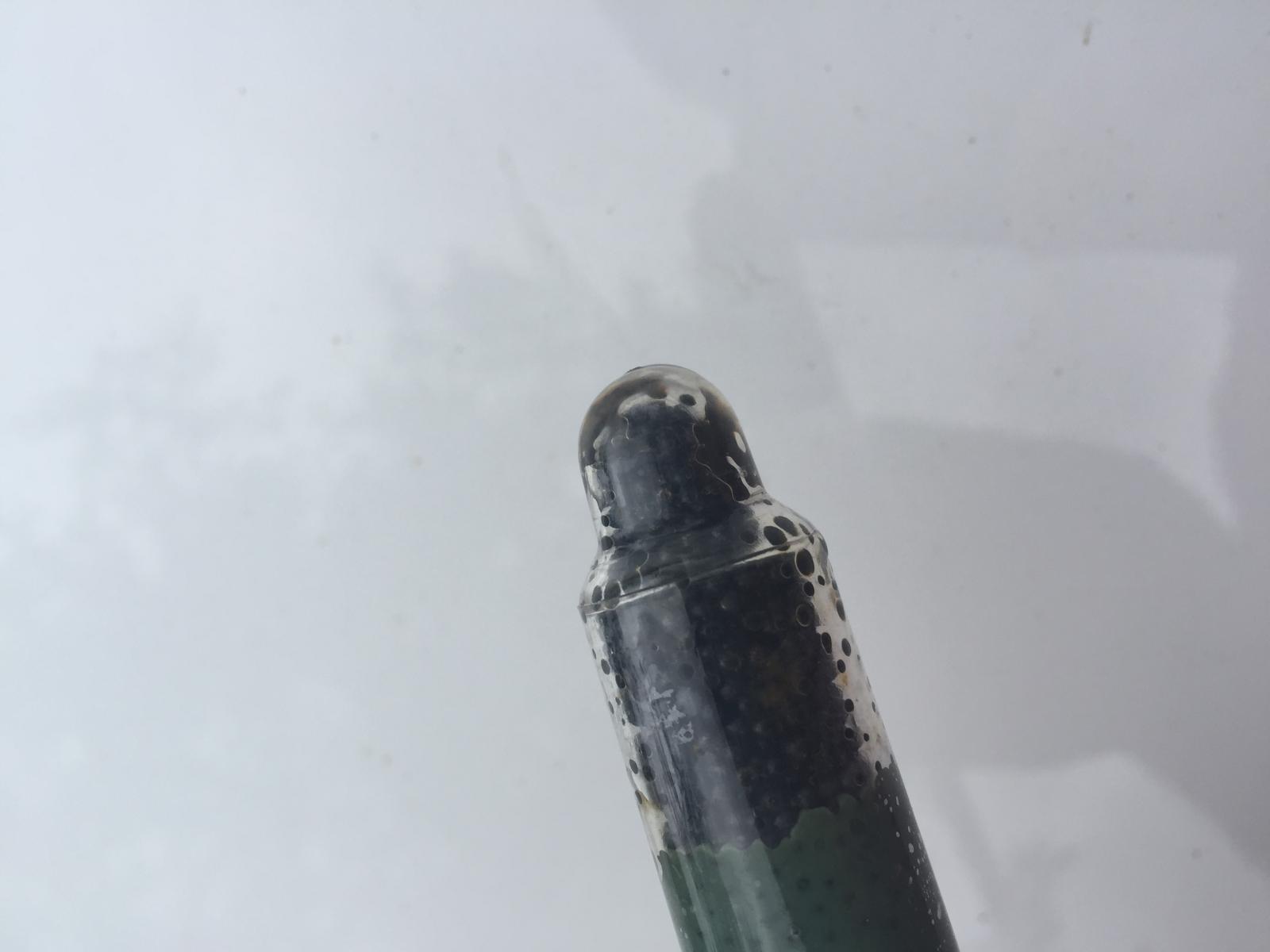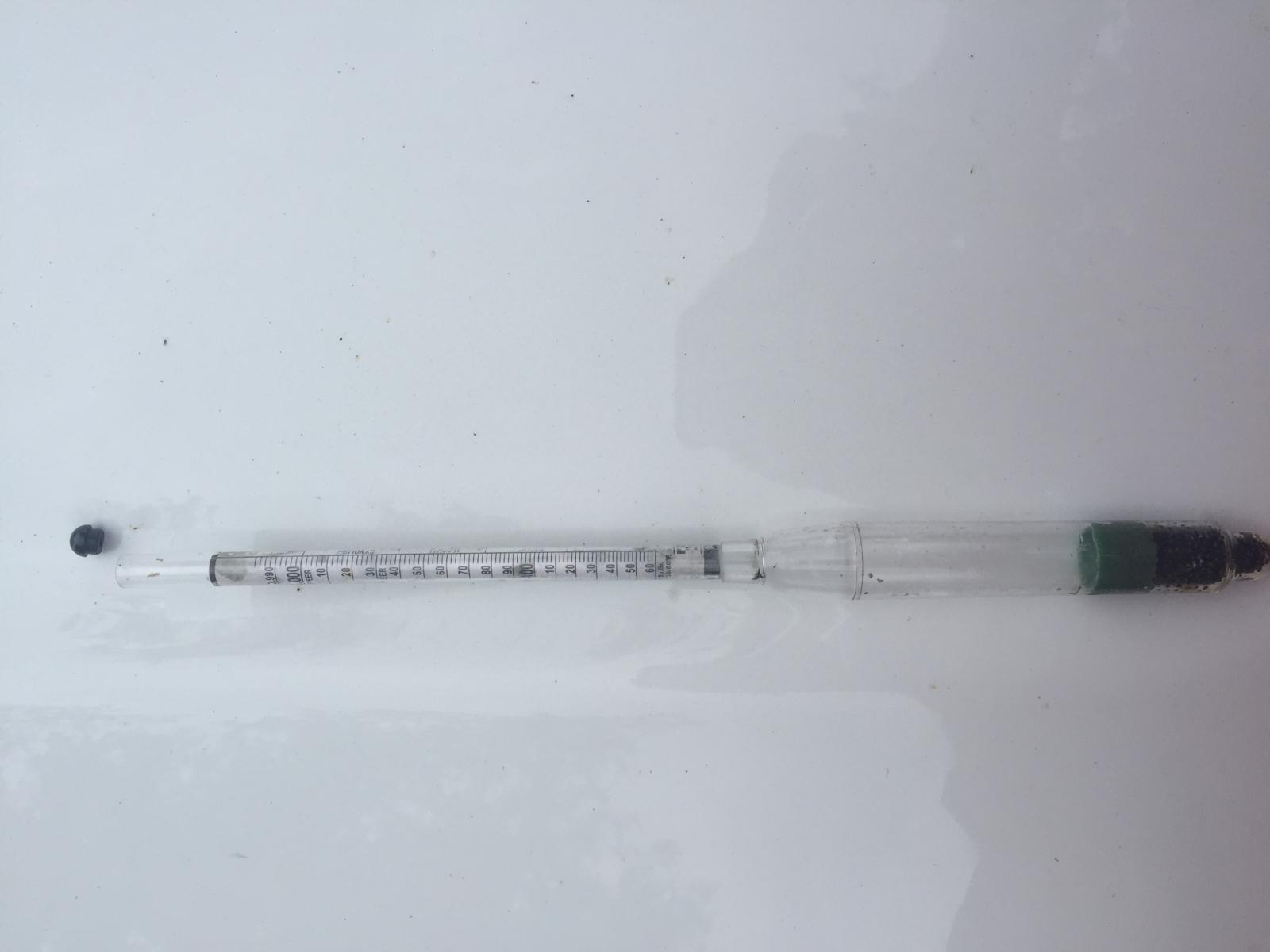Broke my test jar; the hydrometer it came with is more than 20 yrs old, probably out of adjustment so I'm going to just get a new set. What's a good one? Not looking for anything fancy...just accurate and easy to see that the card inside hasn't moved. Suggestions?
You are using an out of date browser. It may not display this or other websites correctly.
You should upgrade or use an alternative browser.
You should upgrade or use an alternative browser.
Good Hydrometer?
- Thread starter MrBJones
- Start date

Help Support Homebrew Talk:
This site may earn a commission from merchant affiliate
links, including eBay, Amazon, and others.
Haven't used this one myself, but I like the fact that it won't break if (when?) you drop it.
http://www.northernbrewer.com/herculometer-triple-scale-hydrometer
http://www.northernbrewer.com/herculometer-triple-scale-hydrometer
Broke my test jar; the hydrometer it came with is more than 20 yrs old, probably out of adjustment so I'm going to just get a new set. What's a good one? Not looking for anything fancy...just accurate and easy to see that the card inside hasn't moved. Suggestions?
Put it in distilled water and see if it reads 0. If so you're good to go.
I second testing your current hydrometer. Mine is about 26 years old and it works fine. There is little chance that it will drift over time unless it developed a crack, which is going to manifest itself pretty quickly.
Personally, I would keep your hydrometer and maybe put the money you would have spent for a new one towards a refractometer, which can be mighty handy when taking measurements during the brewing process.
Personally, I would keep your hydrometer and maybe put the money you would have spent for a new one towards a refractometer, which can be mighty handy when taking measurements during the brewing process.
bobeer
Fermentation Specalist
I second testing your current hydrometer. Mine is about 26 years old and it works fine. There is little chance that it will drift over time unless it developed a crack, which is going to manifest itself pretty quickly.
Personally, I would keep your hydrometer and maybe put the money you would have spent for a new one towards a refractometer, which can be mighty handy when taking measurements during the brewing process.
+1 on the refactometer. I love mine. I can boil a little longer if need be if the gravity isn't quite there at the end of a boil. Measuring the sg of first runnings, boil volumes, etc, makes the brewing process a lot more fun. Not as many question marks during the brew day. It also makes creating the same beer again a little bit easier.
Put it in distilled water and see if it reads 0. If so you're good to go.
I did that, turns out it's reading 4 points too high. Which goes a long way toward explaining how I missed an OG by 5 points.

$58.16
HUIZHUGS Brewing Equipment Keg Ball Lock Faucet 30cm Reinforced Silicone Hose Secondary Fermentation Homebrew Kegging Brewing Equipment
xiangshuizhenzhanglingfengshop

$20.94
$29.99
The Brew Your Own Big Book of Clone Recipes: Featuring 300 Homebrew Recipes from Your Favorite Breweries
Amazon.com

$7.79 ($7.79 / Count)
Craft A Brew - LalBrew Voss™ - Kveik Ale Yeast - For Craft Lagers - Ingredients for Home Brewing - Beer Making Supplies - (1 Pack)
Craft a Brew

$53.24
1pc Hose Barb/MFL 1.5" Tri Clamp to Ball Lock Post Liquid Gas Homebrew Kegging Fermentation Parts Brewer Hardware SUS304(Liquid Hose Barb)
yunchengshiyanhuqucuichendianzishangwuyouxiangongsi

$53.24
1pc Hose Barb/MFL 1.5" Tri Clamp to Ball Lock Post Liquid Gas Homebrew Kegging Fermentation Parts Brewer Hardware SUS304(Liquid Hose Barb)
Guangshui Weilu You Trading Co., Ltd

$33.99 ($17.00 / Count)
$41.99 ($21.00 / Count)
2 Pack 1 Gallon Large Fermentation Jars with 3 Airlocks and 2 SCREW Lids(100% Airtight Heavy Duty Lid w Silicone) - Wide Mouth Glass Jars w Scale Mark - Pickle Jars for Sauerkraut, Sourdough Starter
Qianfenie Direct

$10.99 ($31.16 / Ounce)
Hornindal Kveik Yeast for Homebrewing - Mead, Cider, Wine, Beer - 10g Packet - Saccharomyces Cerevisiae - Sold by Shadowhive.com
Shadowhive

$479.00
$559.00
EdgeStar KC1000SS Craft Brew Kegerator for 1/6 Barrel and Cornelius Kegs
Amazon.com

$22.00 ($623.23 / Ounce)
AMZLMPKNTW Ball Lock Sample Faucet 30cm Reinforced Silicone Hose Secondary Fermentation Homebrew Kegging joyful
无为中南商贸有限公司

$176.97
1pc Commercial Keg Manifold 2" Tri Clamp,Ball Lock Tapping Head,Pressure Gauge/Adjustable PRV for Kegging,Fermentation Control
hanhanbaihuoxiaoshoudian
I did that, turns out it's reading 4 points too high. Which goes a long way toward explaining how I missed an OG by 5 points.
Well, then. Maybe time for a new after all.
And a refractometer...
I love my refractometer. No guess what the hydrometer is reading. That and the grain mill has really made my brew day better.
if you buy a new hydrometer, consider getting one with a narrower band or range: https://www.amazon.com/dp/B00838XR1K/?tag=skimlinks_replacement-20
They are much easier to read as long as you are within the SG range. I use a refractometer pre-fermenting (e.g. mashing, boiling) and then use my narrow band/range hydrometer for final gravity readings.
They are much easier to read as long as you are within the SG range. I use a refractometer pre-fermenting (e.g. mashing, boiling) and then use my narrow band/range hydrometer for final gravity readings.
Last edited by a moderator:
Texasspur21
Member
I've brewed 3 batches with the Hurcelometer. Yes, it's plastic, you can drop it but there is a design flaw in my opinion. The top cap comes off easily. Water is now in the beads on the bottom and its way off the mark.




I've brewed 3 batches with the Hurcelometer. Yes, it's plastic, you can drop it but there is a design flaw in my opinion. The top cap comes off easily. Water is now in the beads on the bottom and its way off the mark.
Set your hydrometer somewhere warm for a week or so with the cap off so the water in the beads can evaporate out. Then superglue the cap on.
Put it in a container with some of that "do not eat" stuff you find packed with electronics during shipment.
BowAholic
Well-Known Member
NB has an "advanced gravity testing kit" with a rack and 3 lab quality narrow range (BIG NUMBERS) hydrometers....makes it much easier to read. no test jar included, but I (carefully) take readings right in my fermentation bucket.
I did that, turns out it's reading 4 points too high. Which goes a long way toward explaining how I missed an OG by 5 points.
The one I have now reads 2 points high, so I always subtract that amount from a reading. The one I broke was spot on, of course.
Do you read it at the calibration temp, usually it's noted on the paper scale?
When brewing all-grain I find a refractometer an indispensable tool. Even when checking a fermenting batch, 1-2 drops will tell me where it is using the correction formula. I bought mine from a large eBay seller for under $25 shipped. It's their "heavier" version.
mikescooling
Well-Known Member
NB has an "advanced gravity testing kit" with a rack and 3 lab quality narrow range (BIG NUMBERS) hydrometers....makes it much easier to read. no test jar included, but I (carefully) take readings right in my fermentation bucket.
I got a bunch of flack from my brew friends about doing this, they say the CO2 needs to be stired out of the beer to read FG. I'd need to take a sample and stir it so the CO2 bubbles don't stick to the hydrometer and make it float.
BowAholic
Well-Known Member
I got a bunch of flack from my brew friends about doing this, they say the CO2 needs to be stired out of the beer to read FG. I'd need to take a sample and stir it so the CO2 bubbles don't stick to the hydrometer and make it float.
I never have heard that...I just spin the hydrometer the same as I do in a testing tube... I always get the right FG or very close to it... interesting.
I got a bunch of flack from my brew friends about doing this, they say the CO2 needs to be stired out of the beer to read FG. I'd need to take a sample and stir it so the CO2 bubbles don't stick to the hydrometer and make it float.
This thread https://www.homebrewtalk.com/f128/does-co2-affect-gravity-286783/ is about CO2 affecting the hydrometer reading. AJDelange has some good explanation. He degasses to get a good reading. I de-gas by pouring from one cup to another back and forth many times and have found it does make a little difference for me.
Similar threads
- Replies
- 63
- Views
- 3K
- Replies
- 0
- Views
- 568
- Replies
- 37
- Views
- 2K

































![Craft A Brew - Safale BE-256 Yeast - Fermentis - Belgian Ale Dry Yeast - For Belgian & Strong Ales - Ingredients for Home Brewing - Beer Making Supplies - [3 Pack]](https://m.media-amazon.com/images/I/51bcKEwQmWL._SL500_.jpg)













